
Animated PowerPoint's originally created to assist deaf students to learn the concept and math of Elasticity of Demand.

Animated PowerPoint's originally created to assist deaf students to learn the concept and math of Elasticity of Demand.
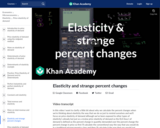
Why we calculate percent changes in a strange way when calculating elasticities. Created by Sal Khan.
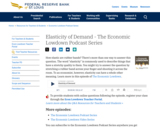
How elastic are rubber bands? There's more than one way to answer this question. The word "elasticity" is commonly used to describe things that have a stretchy quality to them. You might try to answer the question by stretching a rubber band across your finger and shooting it across the room. To an economist, however, elasticity can have a whole other meaning. Learn more in this episode of The Economic Lowdown.
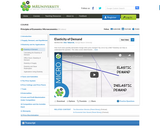
This 13 minute video will demonstrate how the determinants of elasticity affect the demand elasticity of a good or service. This video will aid in the mastery of standard EPF. 3
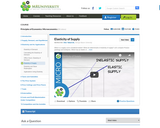
This 15 minute video will illustrate the elasticity of supply graph and how elasticity of supply is calculated using using determinants. This video will aid students in the mastery of EPF. 3
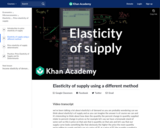
Thinking about elasticity of supply. Created by Sal Khan.
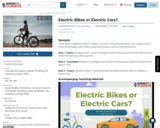
SYNOPSIS: In this lesson, students conduct research on electric bicycles and electric cars, choose one of these technologies, and create a video promoting its use as a climate solution.
SCIENTIST NOTES: Over the course of their use, electric cars are far more environmentally friendly than conventional automobiles. This lesson examines those benefits as well as how to make cities friendlier to bikes and other commuting options. The external resources in this lesson have passed our scientific review process.
POSITIVES:
-Students must use hard data to promote either electric bicycles or electric cars.
-Students record quick, informative videos as their assessment in this lesson plan.
ADDITIONAL PREREQUISITES:
-Students should have a basic understanding of climate change. They should know that burning fossil fuels creates greenhouse gases and that greenhouse gases are heating up the planet.
-There are fourteen total images in the Inquire section. Feel free to disregard some of them based on your needs.
-Many students assume that electric cars do not create emissions at all. Students will learn:
-There are embedded emissions from the manufacturing of electric cars.
-Electric cars that use electricity generated by fossil fuels (coal, oil, and gas) are still creating emissions.
-Your students will need access to devices to record their advertisements. Students can record themselves on iPods, iPads, laptops, or other school devices. Depending on your school's phone policy, you can have your students use their own devices.
DIFFERENTIATION:
-Be sensitive to the socioeconomic situation of your students. Some students' families may not own bicycles or cars or be able to afford electric bicycles or electric cars.
-Creating the advertisement can be done as a homework assignment.
-Students may want to include drawings, puppets, props, or other creative items in their advertisements. Encourage their creative expression!
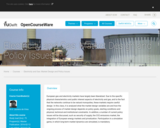
European gas and electricity markets have largely been liberalized. Due to the specific physical characteristics and public interest aspects of electricity and gas, and to the fact that the networks continue to be natural monopolies, these markets require careful design. In this class, it is analyzed what the market design variables are and how the ongoing process of market design depends on policy goals, starting conditions and physical, technical and institutional constraints. In addition, a number of current policy issues will be discussed, such as security of supply, the CO2 emissions market, the integration of European energy markets and privatization. Participation in a simulation game, in which long-term market dynamics are simulated, is mandatory.

Young children are not likely to think past their piggy banks when it comes to safe places to set money aside for those special items. In this short e-book from our Ella's Adventures series, they'll learn that a bank account offers security and a return on savings.
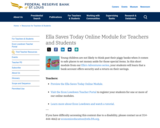
Young children are not likely to think past their piggy banks when it comes to safe places to set money aside for those special items. In this short course from our Ella's Adventures series, your students will learn that a bank account offers security and a return on their savings.
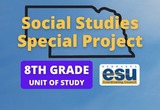
Was the Embargo Act of 1807 worthwhile? This inquiry lesson details the impact on trade barriers through the Embargo Act of 1807. Resource created by Daniel Gossman, Johnson-Brock Public Schools, as part of the Nebraska ESUCC Social Studies Special Projects 2024 - Inquiry Design Model (IDM).
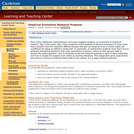
This assignment asks students to propose an original research question and identify data that could be used to answer that question.

The Bureau of Labor Statistics (BLS) has different definitions for employment. Some surveys ask workers what types of jobs they worked. These surveys measure employment as the number of workers in the United States. Other surveys ask businesses to list how many people work for them. Some people may work for multiple companies and will be counted more than once in the survey. These surveys measure employment as the number of jobs in the United States.

Shopping for and owning things are exciting and emotional experiences. We take time and energy thinking about what to buy and the role it will play in our lives. In this Page One Economics®: Focus on Finance article, we look at the endowment effect—how we place more value on items we own than on items we don’t.
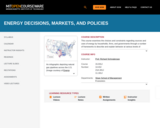
This course examines the choices and constraints regarding sources and uses of energy by households, firms, and governments through a number of frameworks to describe and explain behavior at various levels of aggregation. Examples include a wide range of countries, scope, settings, and analytical approaches.
This course is one of many OCW Energy Courses, and it is a core subject in MIT’s undergraduate Energy Studies Minor. This Institute-wide program complements the deep expertise obtained in any major with a broad understanding of the interlinked realms of science, technology, and social sciences as they relate to energy and associated environmental challenges.
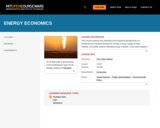
This course explores the theoretical and empirical perspectives on individual and industrial demand for energy, energy supply, energy markets, and public policies affecting energy markets. It discusses aspects of the oil, natural gas, electricity, and nuclear power sectors and examines energy tax, price regulation, deregulation, energy efficiency and policies for controlling emission.
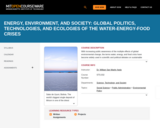
With increasing public awareness of the multiple effects of global environmental change, the terms water, energy, and food crisis have become widely used in scientific and political debates on sustainable development and environmental policy. Although each of these crises has distinct drivers and consequences, providing sustainable supplies of water, energy, and food are deeply interrelated challenges and require a profound understanding of the political, socioeconomic, and cultural factors that have historically shaped these interrelations at a local and global scale.
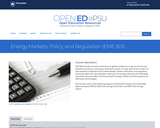
EME 801 provides a broad introduction to global markets for crude oil and refined petroleum products, natural gas, and electric power. A major goal of the course is to help students understand how market design, market institutions, and regulatory structures affect firm-level decision-making in the energy industries and ultimately, how these decisions affect the functioning of energy markets and the prospects for alternative technologies.

Understanding the energy needs and market opportunities in the specific off-grid community or region is the first step for effectively selecting and implementing the solutions to meet a community’s energy needs. MIT D-Lab has developed the Energy Assessment Toolkit to guide organizations through the process of gathering the information needed to make informed decisions about what technologies and business models are best suited to meet the specific needs of their community through market-based initiatives.
This toolkit is designed for any organization that has an on-the-ground presence in an off-grid community or region and has the ability to take action based on the opportunities identified. This community-based assessment approach is not intended to replace studies that track energy access on a national level or to generate market intelligence reports for external organizations looking to expand their business or programs into new markets.
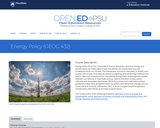
Energy policy sits at the crossroads of science and policy. And now, energy and climate policy are inextricably linked; the policies we choose have very real consequences for our climate. This intersection of science and policy is chaotic and bustles with activity motivated by various competing (and conflicting) interests and factors. We must understand the motivations driving them and bridge the divides between our reliance on fossil fuels and our need to transition to less carbon-intensive and renewable alternatives. While the science and math behind these problems is often fairly straightforward, the politics and behavioral changes are not. Come stand at this busy intersection with us as we navigate toward progressive climate policy alternatives at all scales of governance!